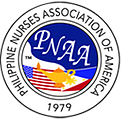PHILIPPINES NURSES ASSOCIATION OF AMERICA, INC. |
JNPARRJNPARR Publications
| JNPARR - Publications - Volume 11 Issue 1 - AbstractEvidence-Based Practice: Are Nurses Ready?Written by Catherine M. Paler & Girlyn Arganza Cachaper doi: https://doi.org/10.13178/jnparr.2021.11.01.1006 DownloadAbstract Background: Nurses have an important role in implementing evidence-based practice (EBP) to deliver high quality care, but they face many challenges. A growing body of research literature focuses on implementing EBP revealing a lack of focus in assessing nurses’ readiness for EBP. Objective: The purpose of this study is to explore nurses’ confidence, knowledge, beliefs, and key barriers to their readiness to implement EBP within a mid-sized acute care hospital in the Mid-Atlantic United States. Methods: Researchers conducted a descriptive cross-sectional survey design; 172 registered nurses completed the 25-item online survey between May and July 2018. Results: The response rate was 32 percent. Respondents were primarily White (57.6%), baccalaureate-prepared (62.2%), employed full-time (79.7%), and over 40 years of age (56.9%). The top three organizational barriers included presence of higher priority goals (69.8%), difficulty in recruiting and retaining staff (68.0%), and lack of organizational budget for education (51.2%). There were three key individual level barriers to using evidence. In addition to time constraints, nurses identified difficulty in accessing research material (48.3%), followed by the lack of electronic database knowledge (33.7%), and insufficient skills to synthesize the literature (33.1%). Consistent with previous research, nearly all respondents (87.8%) agreed that EBP leads to high-quality patient care, yet many sought information frequently from colleagues (52.3%) or the internet (52.8%). Conclusion: Nearly all respondents were familiar with EBP and agree that it leads to positive patient outcomes. Most nurses felt confident in performing patient-centered EBP activities but reported a lower confidence in critically appraising research. In addition to time, barriers included difficulty accessing research materials and the lack of ability to synthesize the literature. In this institution, nursing leadership identified areas of need. Nursing leadership can use the survey findings to develop opportunities to strengthen EBP’s role in nursing practice. Action can be a significant undertaking. Strategies for implementation are crucial to begin at the leadership level and align with Magnet Recognition Program® standards for increased professional development and achieve high-quality, evidence-based care. Keywords: evidence-based practice, nursing, readiness, clinical practice, competency, innovation |
